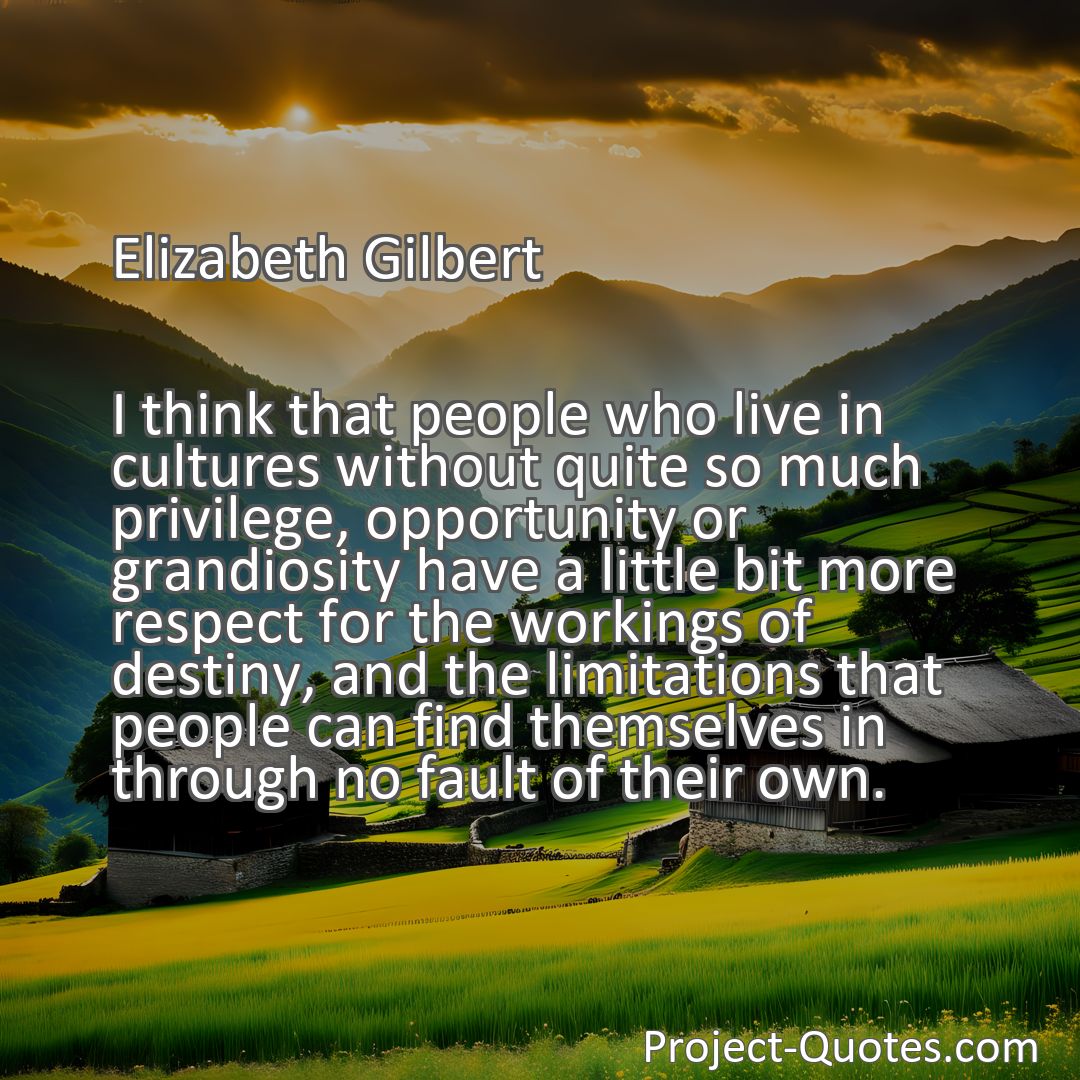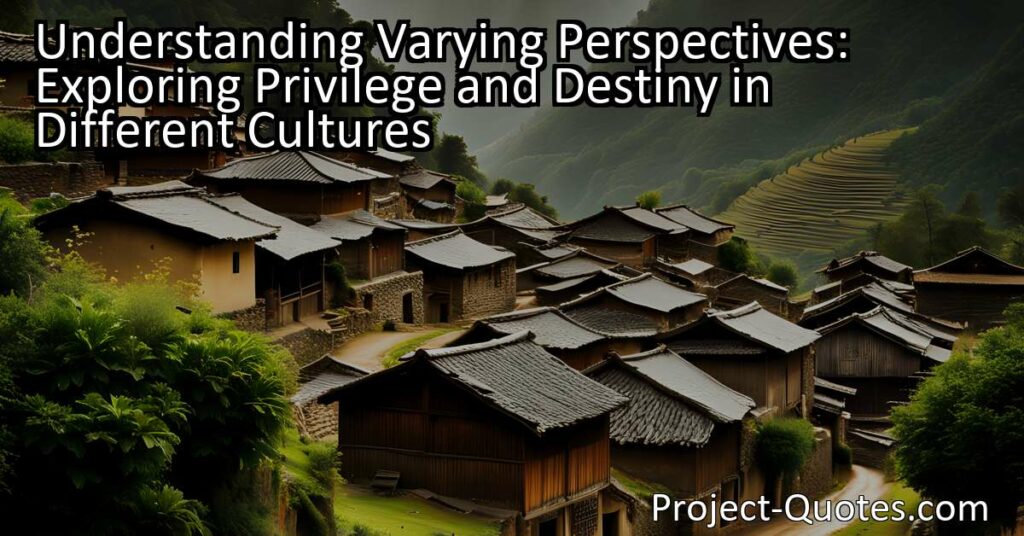I think that people who live in cultures without quite so much privilege, opportunity or grandiosity have a little bit more respect for the workings of destiny, and the limitations that people can find themselves in through no fault of their own.
Elizabeth Gilbert
Understanding Varying Perspectives: Exploring Privilege and Destiny in Different Cultures Elizabeth Gilbert’s quote prompts us to consider the differing viewpoints people have regarding privilege. Cultures that emphasize wealth and power may overlook the impact of external circumstances, while those with fewer privileges recognize the role of destiny in shaping lives. By understanding and appreciating varying perspectives, we can foster empathy, humility, and a more inclusive society.
Table of Contents
- 1 I think that people who live in cultures without quite so much privilege, opportunity or grandiosity have a little bit more respect for the workings of destiny, and the limitations that people can find themselves in through no fault of their own.
- 2 Elizabeth Gilbert
- 3 Meaning of Quote – I think that people who live in cultures without quite so much privilege, opportunity or grandiosity have a little bit more respect for the workings of destiny, and the limitations that people can find themselves in through no fault of their own.
- 4 Freely Shareable Quote Image
- 5 Related
Meaning of Quote – I think that people who live in cultures without quite so much privilege, opportunity or grandiosity have a little bit more respect for the workings of destiny, and the limitations that people can find themselves in through no fault of their own.
In her thought-provoking quote, Elizabeth Gilbert reflects on the differences in perspective between individuals who live in cultures with varying levels of privilege, opportunity, and grandiosity. According to Gilbert, people who come from less privileged backgrounds tend to have a greater appreciation for the role of destiny and the constraints that others may face, even when it is not their fault. Through this observation, Gilbert suggests that individuals in such cultures demonstrate more respect for the inherent limitations that life may present.
It is undeniably true that the society in which we live greatly influences our perception of privilege, opportunity, and grandiosity. Some cultures place heavy emphasis on wealth, status, and power, instilling a desire for material success and dominance. In these cultures, the pursuit of personal achievements and the belief in self-determination may overshadow the recognition of circumstances beyond one’s control.
On the other hand, individuals who reside in societies with fewer privileges and limited opportunities tend to have a different outlook on life. These individuals understand firsthand the harsh realities of lacking access to resources, education, and upward mobility. They recognize the fragility of life and the factors that can easily veer one’s path towards fortune or misfortune.
In societies with less grandiosity, people often have a humbler approach to life. They appreciate the workings of destiny because they have experienced firsthand how circumstances beyond one’s control can shape their lives. They understand that not everyone is afforded equal opportunities or advantages, and as a result, they have greater empathy and understanding for the struggles faced by others.
For instance, imagine a young girl growing up in a poverty-stricken neighborhood where violence and crime are prevalent. Despite her innate talent and ambition, she struggles to break free from the limitations imposed by her environment. Her lack of access to quality education and opportunities further hinder her progress, preventing her from reaching her full potential. In this scenario, it becomes evident that her limitations are not her fault, but rather a consequence of the society in which she was born.
In cultures that cherish privilege and grandiosity, however, it can be easy to ignore or dismiss these external factors. Those who have benefitted from favorable circumstances may find it difficult to empathize with the struggles faced by individuals in less privileged settings. Often, the prevailing belief becomes one of meritocracy, where personal success is attributed solely to individual effort and hard work.
Nevertheless, Gilbert suggests that there is value in recognizing the limitations imposed by circumstances and destiny. It is crucial to develop a sense of empathy and understanding for those who navigate life’s obstacles with fewer resources and advantages. This perspective reminds us to acknowledge that success or failure is not solely predetermined by personal qualities or lack thereof but can be significantly influenced by external factors beyond our control.
In contrast to cultures that prioritize grandiosity, those with more modest aspirations often possess a profound respect for the workings of destiny. They understand that their own choices and actions are not solely responsible for their circumstances because they have witnessed others who have worked just as hard or even harder without finding the same opportunities. This recognition fosters a sense of humility that encourages empathy and support for those facing similar limitations.
Additionally, individuals who come from less privileged cultures can demonstrate a greater appreciation for the possibilities presented by destiny. By recognizing the influence of external forces, they may be more open to the potential for unexpected opportunities and interventions that can shape their lives positively. This openness allows them to embrace various paths and adapt to change more readily.
In conclusion, Elizabeth Gilbert’s quote encourages us to reflect on the varying perspectives individuals may hold concerning privilege, opportunity, and grandiosity. Cultures that prioritize these ideals often tend to overlook the limitations imposed by external circumstances, attributing individual success solely to personal effort and merit. However, individuals in societies with fewer privileges demonstrate a deeper respect for destiny and an understanding that limitations can exist through no fault of one’s own. By recognizing the role that destiny and circumstances play in shaping lives, we can cultivate empathy, humility, and a broader perspective. Ultimately, embracing these qualities allows us to better support and advocate for those who face significant limitations, fostering a more compassionate and inclusive society.
I hope this quote inspired image brings you hope and peace. Share it with someone who needs it today!


